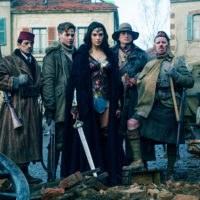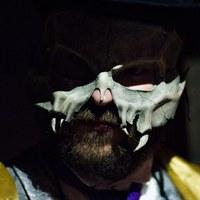Most sci-fi TV is more about action and spectacle than anything thoughtful, but one show that really did the intellectual side of science fiction justice was Prisoners of Gravity, which aired on TVOntario from 1989 to 1994. On the show, host Rick Green used science fiction to explore far more serious topics.
“You’re talking with people who are really imaginative,” Green says in Episode 261 of the Geek’s Guide to the Galaxy podcast. “So the answers they’re coming up with on how to save the world or how to save the planet—or how to lay out a comic book—are really interesting.”
Gregg Thurlbeck, who served as a producer on Prisoners of Gravity, says the show draws on material from hundreds of interviews. “An idea could be built over the course of a couple of years,” he says. “Do we have enough to do the utopia show yet? No, we really need Kim Stanley Robinson for that, we’d love to have Ursula Le Guin, so it’s not quite baked.
Another producer, Mark Askwith, says he’s glad the show has aged so well. It helps that many of the rising young authors who appeared on Prisoners of Gravity are now literary superstars.
“I hear all the time from people who go, ‘I can’t believe you interviewed Alan Moore, I can’t believe you got Neil Gaiman in 1989,’” Askwith says. “Well we did, and it almost becomes a historical artifact.”
Unfortunately, when it comes to sci-fi TV, Prisoners of Gravity has been seldom imitated and never duplicated. But Askwith says the internet is starting to pick up some of the slack.
“I think podcasts really seem to mirror the energy of Prisoners of Gravity, because they can, because they don’t have to go after a mass audience,” he says. “If our legacy has been anything, it’s not that we affected television, it may be that we affected podcasts.”
Listen to the complete interview with Rick Green, Gregg Thurlbeck, and Mark Askwith in Episode 261 of Geek’s Guide to the Galaxy (above). And check out some highlights from the discussion below.
Related Stories
Rick Green on interview prep:
“If you’re a science fiction author and you live in Racine, Wisconsin, you might be allowed to get on the local cable show ‘Good Morning Racine,’ and your introduction would be, ‘Coming up, Susan Ellis, a lady who loves unicorns and has been to Mars, ha ha ha!’ And they hadn’t read the book—the researcher hadn’t even read the book, they’d read the book flap. And I guess it was the second season, when we were in New York at the one convention, and some of the authors we had interviewed were going around and telling the other writers—who were reluctant to be interviewed—they were saying basically, ‘No, no, these people do it right. These guys know what they’re talking about, they’ve read your book, you’ll be amazed.’”
Gregg Thurlbeck on John Varley:
“I’d been trying to get in touch with him and arrange an interview for a number of years. Spider Robinson is his good friend, and I’ve interviewed Spider a couple of times, and so he made arrangements that we would be able to do an interview. … I was going to drive down to Portland and do the interview at his home, and I drove all the way down to Portland, and he cancelled, so we never did get John Varley. And as I mentioned right off the top, he was one of the authors that really introduced me to what science fiction could do, where it could take you, how it could explore things that were very difficult to explore in mainstream writing. So that’s the one that got away, from my point of view.”
Rick Green on authors:
“Today I don’t know what it would be like, because so many authors are so primed on what to say, they’ve got their talking points and so on. But I always felt like our interviews—with comics people especially, but with authors as well, in science fiction and in fantasy and horror—they were really conversations, and they were groundbreaking. It wasn’t like they were giving you their sales pitch, their catchphrases and so on. They were really struggling to describe what they were trying to do, because they’d never been asked about it before. It wasn’t like they had pat answers to everything.”
Mark Askwith on the legacy of Prisoners of Gravity:
“I remember pitching the show to Daniel Richler and saying, ‘I’m not sure if this is a show for people from Toronto, where there are major conventions and where you can go to the Silver Snail, or you can go to Bakka, but if you’re living in Thunder Bay, if you’re living in a remote place in Ontario, you’ll be the one person watching in, maybe, Ancaster, but this will be the most important show to you. And 25 years later we have these people come up to us and say, ‘I’m now drawing for Marvel comics—or I just got my first story published—and the reason is because I saw Prisoners of Gravity.’ And that’s incredibly moving to me.”



